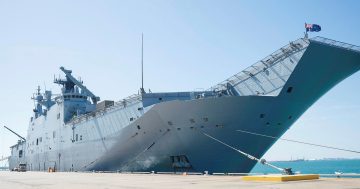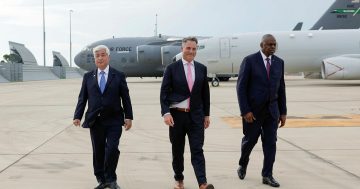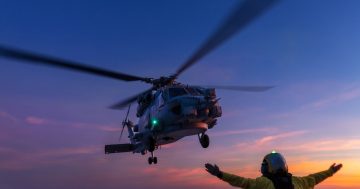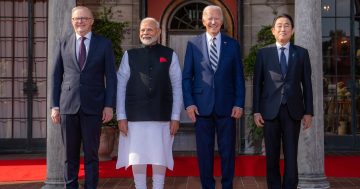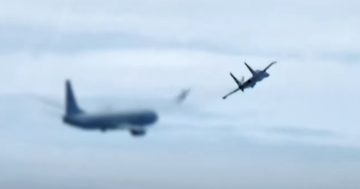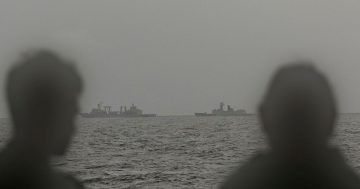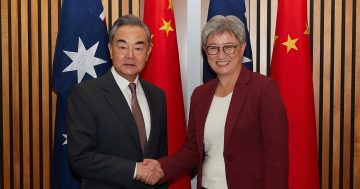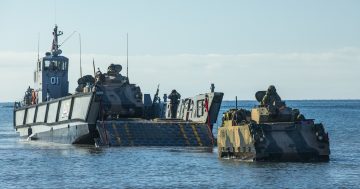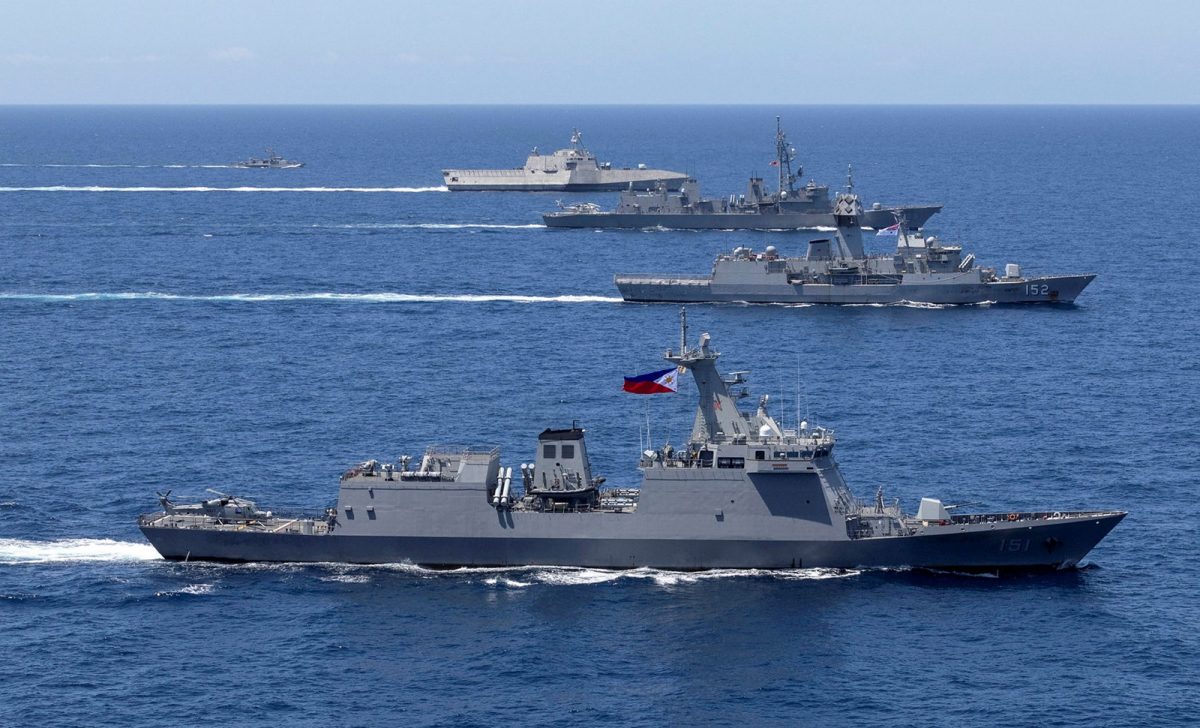
(From foreground) Naval vessels from the Philippines, Australia (HMAS Warramunga), Japan and the US, and another from the Philippines, sail together in the South China Sea on Sunday. Photo: ADF.
Naval vessels from Australia, Japan and the US have held joint exercises with the Philippines Navy in the South China Sea in the face of increasing belligerence on the part of the Chinese Coast Guard and militia in the contested region.
Conducted in the Philippine Exclusive Economic Zone off the coast of the island of Palawan on the weekend, the maritime cooperative activity (MCA) comprised five vessels and air force units – including an RAAF Boeing P-8A Poseidon maritime surveillance aircraft – operating together in a demonstration of a mutual respect for maritime rights under international law, which is reflected in the UN Convention on the Law of the Sea (UNCLOS).
In contravention of a 2016 UNCLOS ruling, China continues to claim most of the South China Sea right up to the continental shelves of the Philippines, Malaysia, Brunei, Indonesia and Vietnam, all of which also claim various overlapping segments of the maritime region.
China has also built several military bases on low-lying coral atolls, and frequently harasses or blocks the transit of fishing, commercial and military vessels of the surrounding nations.
Most recently, in late March, an attempt by the Philippines to resupply a Marine garrison permanently stationed on board a grounded former landing craft on a coral atoll saw Chinese Coast Guard vessels harass a small, unarmed boat with high-pressure fire hoses.
The BRP Sierra Madre was deliberately run aground on Second Thomas Shoal in the Philippines’ claimed region of the South China Sea in 1999, and has hosted a Philippine Marine Corps garrison to symbolically assert the Philippines’ sovereignty over the area ever since.
The rusting hulk frequently runs short of supplies as airdrops are picked up by Chinese vessels, or Philippine vessels are blockaded by the Chinese Coast Guard.
A joint statement from the four nations says the MCA was conducted by naval, maritime and air force units in a manner that is consistent with international law as well as domestic laws and rules of respective nations, and with due regard to the safety of navigation and the rights and interests of other states.
It said it demonstrated professional interactions among naval/maritime and air forces, and strengthened the interoperability of the armed forces’ doctrines, tactics, techniques and procedures.
“We stand with all nations in safeguarding the international order – based on the rule of law – that is the foundation for a peaceful and stable Indo-Pacific region,” it said.
“Our four nations reaffirm the position regarding the 2016 South China Sea Arbitral Tribunal Award as a final and legally binding decision on the parties to the dispute.”
Defence Minister and Deputy Prime Minister Richard Marles said Australia was committed to working with its Pacific partners to uphold the global rules-based order.
“Australia has consistently emphasised the importance for all states to be able to exercise rights and freedoms, including freedom of navigation, in a manner consistent with international law, particularly the United Nations Convention on the Law of the Sea,” he said.
“This Maritime Cooperative Activity with our partners, the Philippines, Japan and the United States, demonstrates our unwavering commitment to working together to maintain a peaceful, stable and prosperous region.”
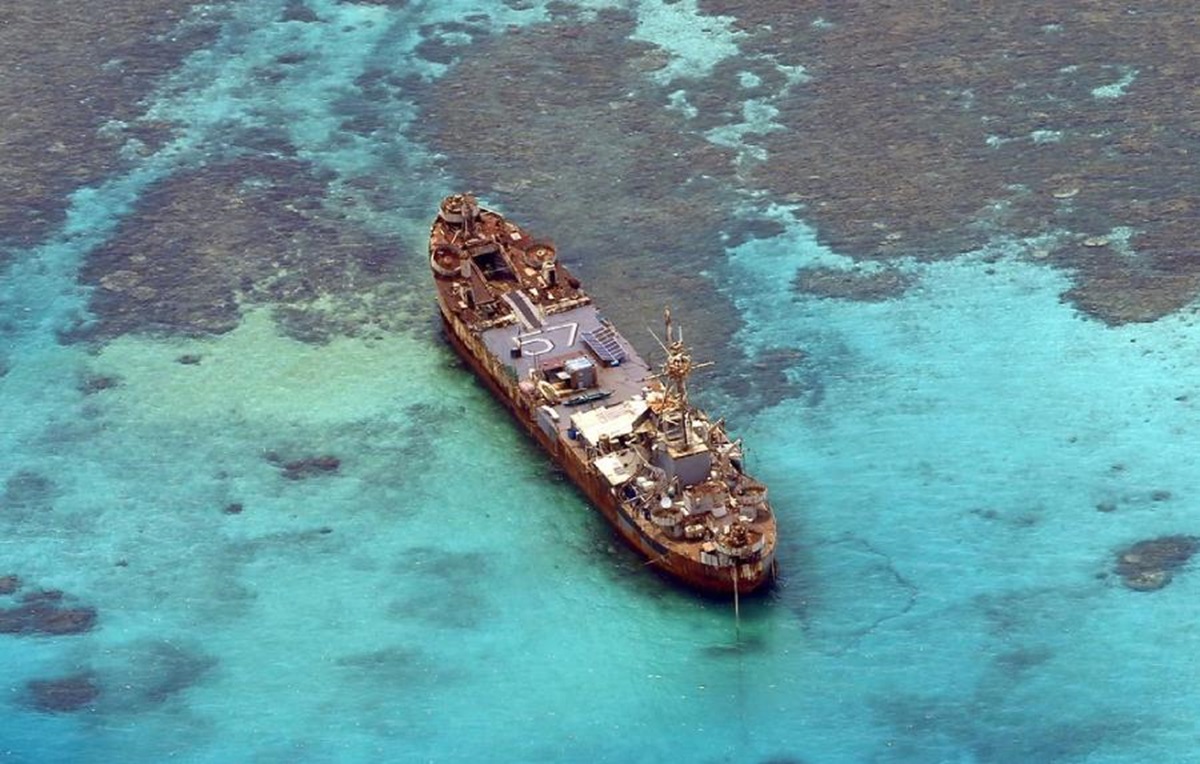
The BRP Sierra Madre was run aground on Second Thomas Shoal in 1999 and has been manned by a garrison of Marines ever since. Photo: Philippines Armed Forces.
Japan’s Defence Minister Kihara Minoru added: “Guided by the vision of a Free and Open Indo-Pacific (FOIP), Japan has the vital importance of striving to realise a free and open international order based on the rule of law and securing regional peace and stability in cooperation with its ally, like-minded countries and others.
“Japan believes that the issue concerning the South China Sea is directly related to the peace and stability of the region and is a legitimate concern of the international community including Japan, Australia, the Philippines, and the United States, and thus Japan opposes any unilateral changes to the status quo by force, such attempts as well as any actions that increase tensions in the South China Sea.”
Philippine Secretary of National Defence Gilberto C Teodoro Jr added: “The Comprehensive Archipelagic Defense Concept (CADC) that we are implementing includes strengthening and deepening cooperation and interoperability with all nations, big and small, to maintain regional peace and stability as well as good order at sea based on international law, principally UNCLOS.
“The series of bilateral and multilateral MCA is a step in building our country’s capacity for individual and collective self-defence.
“This first in a series of activities demonstrates the enduring friendship and partnership among the peace-loving peoples of the Philippines, United States, Australia and Japan.”
At a summit later this month, US President Joe Biden, Japanese Prime Minister Fumio Kishida and Philippine President Ferdinand Marcos Jr are expected to sign an agreement to conduct more regular trilateral patrols in the South China Sea.



